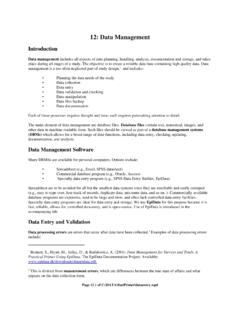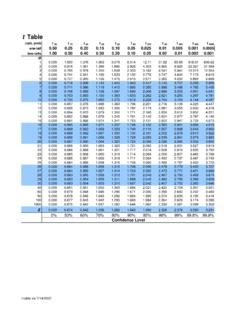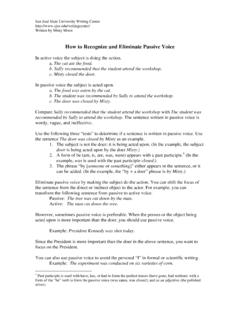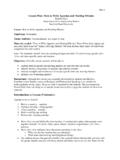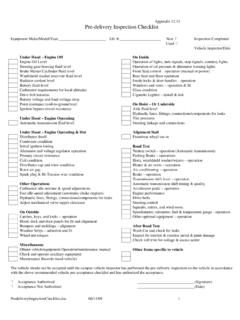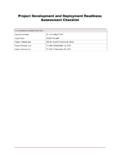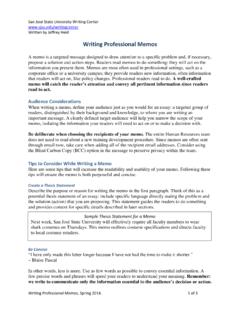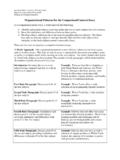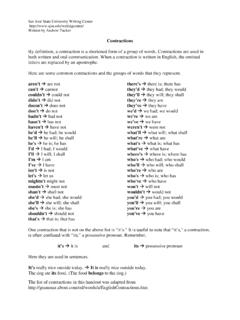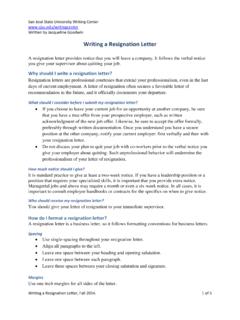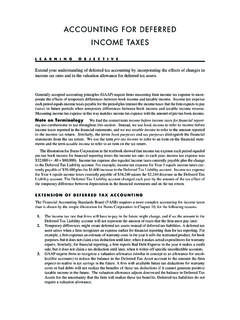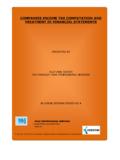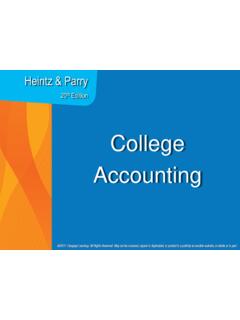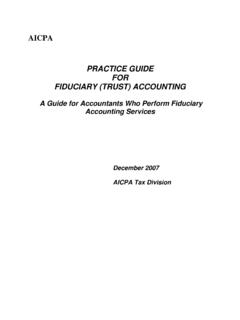Transcription of Accounting for Income Taxes - sjsu.edu
1 1 Accounting for Income TaxesTom Dong, Partner Deloitte Louis Gomes, Partner BDO Dean Kamahele, Principal KPMG Altera3 Altera Tax Court issued its opinion on July 27, 2015 Held: 2003 cost-sharing regulations ( 2003 Regulations ) requiring stock based compensation ( SBC ) to be included as an intangible development cost are invalid Rationale: The 2003 Regulations, and the process under which they were promulgated, failed to take into account that uncontrolled parties acting at arm s length would not share SBC. Thus, the regulation was held to be inconsistent with the arm s length standardUnanimous decision of the Tax Court Note that the IRS had previously lost a similar Tax Court case in Xilinxin 2005 (affirmed by the 9thCir in 2010) with respect to the 1995 cost-sharing regulations4 Decision Timeline Opinion issuedon July 27, 2015 Once all mathematical computations have been settled and provided to the Tax Court, the decision will be entered Decision is not considered finaluntil 90 days after it is entered A party dissatisfied with the judgment has the option to challenge through either a post-trial motion or a notice of appeal.
2 Post-trial motion is a request for the Tax Court to reconsider some aspect of its opinion Note the opinion was unanimous so query whether this period (as it relates to the option to pursue a post-trial motion) is merely administrative here If the IRS appeals, the decision does not become final until an appellate court (in this case the Ninth Circuit Court of Appeals) renders its final decision5 Altera Tax Return ImplicationsCost sharing agreementsOther areas Platform Contribution Transactions? Was your PCT determined using a method based on financial projections Section controlled services transactions?6 Altera Tax Return Implications - continuedIs cost sharing of SBC still permitted? Consider that the Regulation has not yet been withdrawn Form 8275R?Might there be reasons why you would want to continue sharing SBC?
3 Cash implications Lack of cash tax benefit7 Altera Income Tax Provision ImplicationsMust consider both the timingand amountof benefit recognitionUncertain tax position two-part evaluation: Recognition Is the position more-likely-than-not to be sustained based on its technical merits, if challenged, and taken to the court of last resort Measurement What is the largest amount of tax benefit that is greater than 50 percent likely of being realized upon settlement with a taxing authority having full knowledge of all relevant information8 Altera Income Tax Provision Implications Benefit RecognitionWhen is there a change in law? Opinion issued? Decision entered? Decision final? Final decision on appeal (or IRS decision not to appeal)Is the legal language in a CSA relevant?
4 What do your existing legal agreements require you to do? Will you amend your legal agreements? Are you likely to eventually claim a benefit for the current year? If so, what is your triggering event?9 Altera Income Tax Provision Implications Benefit MeasurementDistinguish the current year and prior yearsCurrent year benefit may be obtained without claw-back or refund applicationPrior year may require amended returns and/or the use of claw-back provisions 10 Altera Income Tax Provision Implications Benefit MeasurementWhat is the refund mechanism for prior years?Claw-back of all SBC from past years in the current year? Is this permissible? MLTN?1120X? Self-initiated adjustment? See (a)(3)? Statute of limitations? Subject to a closing agreement? NOL carryforward adjustment Joint Committee approval needed?
5 11 Altera Income Tax Provision Implications - OtherValuation Allowances? Consider impact to future sources of US Income Impact on foreign source Income and foreign tax credit calculationsIndefinite Reinvestment of Earnings (APB 23) Exclusion of SBC from CSA results in an increase to foreign earnings and an increase to offshore cashDeferred Tax Asset for Share-based Compensation Grant vs exercise methodFASB Developments- Shared based compensation- Other proposed changes13 Basic concepts current guidance If a deduction is ordinarilyexpected for the intrinsic amount (when taxable to the employee), treat the amount of financial reporting expense to date as a deductible temporary difference Do not adjust the deductible temporary difference between when it is initially set and the determination of the actual tax deduction (absent changes in expected forfeitures)
6 If actual deduction exceeds the book expense, record the related tax benefit to APIC when realized If the actual deduction is less, write-off the under-realized DTA to the APIC pool orif there is insufficient APIC pool to tax expenseStatement of cash flows ASC 230, Statement of Cash Flows, prescribes the way excess tax benefits from share-based awards are shown on the cash flow statement Gross excess taxbenefits must be reported as a financing cash inflowOverview tax Accounting under ASC 718 & 50514 APIC pool tracking Realization requirement Ordering rules With / Without & Tax Return Ordering Indirect tax effects Cash flow presentation What is my free cash flow? Share-based CompensationComplexities in application (current guidance)15 October 8, 2014 meetingThe Board added a project to improve the Accounting for share-based payment to employees in the following areas.
7 Withholding requirements, presentation in the statement of cash flows, Accounting for forfeitures and Accounting for Income taxesAccounting for Income Taxes upon Vesting or Settlement of Awards Excess tax benefits and tax deficiencies would be recognized within the Income statement Remove the requirement to delay recognition of an excess tax benefit until the tax benefit is realizedPresentation of Excess Tax Benefits on the Statement of Cash Flows-Remove the requirement that employers present excess tax benefits as a cash inflow from financing activities and a cash outflow from operating activitiesFebruary 4, 2015 meetingThe Board tentatively decided on transition guidance A cumulative-effect adjustment to equity as of the beginning of the annual period in which the guidance is effectiveShare-based payment Accounting improvements16 June 8, 2015 The Exposure Draft was issued -Improvements to Employee Share-Based Payment Accounting (2015-270) Question 2a Should excess tax benefits and deficiencies be recognized in the Income statement?
8 Question 2b - Should an entity delay recognition of an excess tax benefit until the benefit is realized through a reduction of tax payable? Question 3 Should the effect on tax cash flows related to excess tax benefits be classified as an operating activity on the statement of cash flows?August 14, 2015 -Comment period endedShare-based payment Accounting improvements17 Share-based payment Accounting improvementsSummary of the comments Respondents included industry groups, public Accounting firms, companies, educators, and professional organizations [69 comment letters were received]. Diverse views were expressed about the proposed changes to eliminate the APIC Pool and record excess tax benefits and tax deficiencies in the Income statement ( P&L ).Common views expressed by proponents: Tax effects are associated with compensatory arrangements.
9 Therefore appropriate in P&L Users more thoroughly review the P&L than the statement of changes equity, providing more transparency Ta x disclosures will allow investors to understand impact on earnings of such itemsCommon views expressed by opponents: Increased earnings volatility from Income statement classification Impact on the effective tax rate, therefore drawing more investor attention Recording excess benefits and shortfalls to APIC supports the two-transaction approach, and represents a true equity transaction Majority were supportive of Operating Activity classification on the SOCF18 Share-based payment projectNext Steps FASB is currently reviewing the comment letters received from stakeholders to understand the concerns expressed Conducting outreach to respondents related to the elimination of the APIC pool The Board is expected to redeliberate the share-based payment project in late October Based on the overwhelming support for certain aspects of the exposure draft.
10 The Board may decide to move forward with certain portions while delaying the implementation of other aspects Unlikely that the FASB will completely drop the unfavorable aspects but will continue to conduct outreach to better understand stakeholder concernsOther Proposals20 Deferred Tax ClassificationJanuary 22, 2015 FASB issued two proposed ASUs as part of a simplification initiativeSimplification initiative #1 Balance sheet classification Classify all deferred Taxes as noncurrent Jurisdictional netting still required May 29, 2015 Comment period ended 29 respondent comment letters were received Overwhelming support of the proposed guidance and simplificationCurrent status On October 5, 2015, the Board affirmed the proposed ASU for the balance sheet classification.
